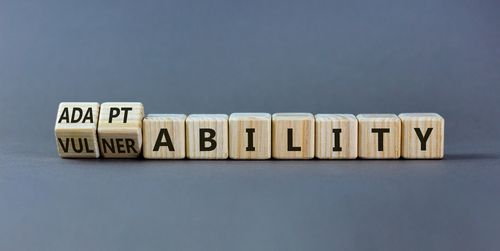 Most people like to feel as if they have some measure of control over their lives. They may not want to think too much about the things that scare them, or if they do, they want to have a plan of action to avoid them. You probably already know that this is not always possible, though.
Most people like to feel as if they have some measure of control over their lives. They may not want to think too much about the things that scare them, or if they do, they want to have a plan of action to avoid them. You probably already know that this is not always possible, though.
Researchers define vulnerability as taking risks, embracing uncertainty and being honest about emotions. These are not things that most people are usually eager to run toward. If you do take a chance on leaning into your vulnerability, though, you may be surprised by how many benefits you reap.
Improves Self-Awareness
Vulnerability can help you set healthy boundaries. You may be afraid of admitting your limits to others, but the courage to do so allows you to stand your ground. What you may think will come across as a weakness may actually be the thing that keeps you from saying yes to too many things or making a commitment when your heart's just not in it.
The wonderful thing about self-awareness that comes from being intentionally vulnerable is that it also can reveal strengths you didn't know you had. You may discover a deep kindness that you'd previously covered up with sarcasm. Perhaps you'll unveil a passion for something that you were too proud to take seriously before. If nothing else, you'll find that it's much easier to be humble when you practice vulnerability. You are likely to notice that you have more wisdom and strength of character than you thought you did, and that is empowering.
Heightens Emotions
There are many reasons people avoid vulnerability:
- Unwillingness to appear weak
- Fear of the unknown
- Lack of trust in those around them
- Uncertainty about their worthiness
When you neglect to acknowledge the ways in which you are vulnerable, however, you inevitably shut off your ability to process the emotions that go along with that knowledge. As enticing as this may sound, there is an unpleasant flipside. By refusing to deal with negative emotions, you rob yourself of the positive ones as well.
Embracing vulnerability may not always feel good. In fact, the fear and frustration that typically arise when you feel vulnerable can be overwhelming at times. There's no match for the joy and confidence that come with being your imperfect, authentic self, though.
Strengthens Connections With Others
Identify what makes you angry. Anger is a secondary emotion that generally stems from a fear of something. When you get to the roots of your fears, you are less likely to lash out by blaming others for your difficulties. You may begin to realize that you don't have to be threatened by disagreement or other worldviews. They don't have to be wrong for your viewpoint or your feelings to be valid. Learning this opens up opportunities to connect with them.
Being honest with other people about who you are is also contagious. Revealing your true feelings and disclosing information about yourself is likely to result in the other person wanting to do the same, even if their feelings are different. Sharing a vulnerable truth about yourself can also inspire others to have the courage to be more open about who they are. There's no limit to the impact this can have on your community and the world.
Being vulnerable is rarely comfortable or easy, but that doesn't mean it isn't worthwhile. There are many benefits to exploring uncertainty and embracing situations in which being honest is a risk. When you allow your vulnerability to teach you more about yourself, you unleash its power to transform your self-confidence, your relationships and your community.



